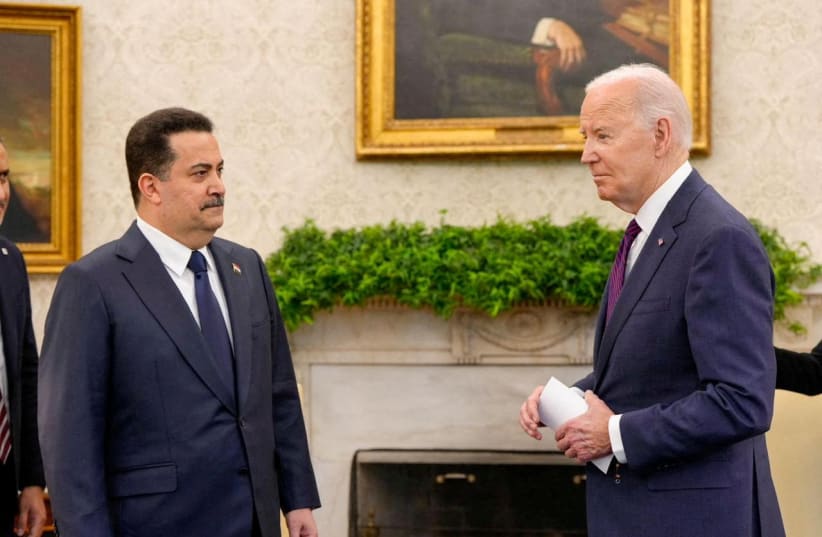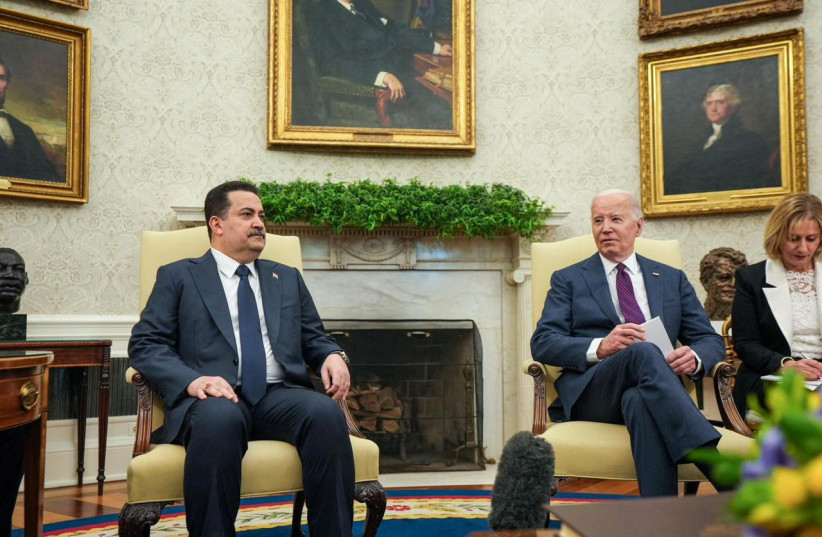Iraqi Prime Minister Mohammed Shia al-Sudani called for restraint in the Middle East on Monday during talks in Washington as tensions soar between Iran and Israel after Tehran's weekend strikes.
"We encourage all the efforts of stopping the expansion of the area of conflict, especially the latest development," Sudani said at the White House at the start of a meeting with President Joe Biden.
The meetings come as US ally Israel weighs its response to Iran's missile and drone attack, with the United States and Europe urging restraint.
Iraq is a rare ally of both Washington and Tehran. Iraqi airspace was a main route for Iran’s unprecedented drone and ballistic missile attack on Israel, and Iraqi officials say Iran informed them, as well as other countries in the region, ahead of the attack.
Sudani is leading a delegation that met officials across Washington on Monday, including Biden and Defense Secretary Lloyd Austin.
"In the spirit of partnership our views may be divergent about what’s happening in the region," Sudani said through a translator as he sat next to Biden in the Oval Office.
"But we agree certainly about the international law, the international humanitarian law and the responsibility to protect and the law of war, and we reject any repression against the civilians, especially women and children, and we encourage the commitment about respecting international norms and diplomatic missions."
Committing to Israel's security
Biden said Washington was committed to Israel's security and to bringing an end to fighting in Gaza.
"We're committed to a ceasefire that will bring the hostages home and preventing conflict from spreading beyond what it already has," Biden said.
"The partnership between the United States and Iraq is critical," he added, noting efforts against ISIS and the two nations' critical strategic agreement.
Deputy Prime Minister Muhammad Ali Tamim, who co-chaired a meeting of the US-Iraq Higher Coordinating Committee with US Secretary of State Antony Blinken, said Iraq was concerned about its region being "dragged into a wider war that will threaten international security and safety."
"And therefore we call on all parties for self-restraint and respect the rules of diplomatic works and also international laws," he said.
US and other Western officials have welcomed economic reform plans put forward by Sudani, but concerns remain over the influence of Iran-backed groups. Shi'ite Muslim armed groups have engaged in tit-for-tat attacks on US forces linked to Israel's war in Gaza.
The United States has 2,500 troops in Iraq, advising and assisting local forces to prevent a resurgence of Islamic State, which in 2014 seized large parts of Iraq and Syria before being defeated.
At the Pentagon, Austin said both countries agree "on the need to transition to an enduring bilateral security relationship" and said military leaders were conducting assessments to inform talks on a potential reduction in US troop numbers in Iraq.
Separate from talks on ending the US-led military coalition in the country is the Higher Coordinating Committee, which is tasked with discussing other aspects of the relationship, including economic ties.
Blinken, who reiterated that Washington does not want the regional conflict to swell, said the meetings would focus on issues including energy security, democracy, the rule of law, climate and water, and noted US private sector interest, especially in Iraq's energy sector.
"Through these efforts we look forward to helping advance the prime minister's affirmative agenda, and seeing Iraq succeed," Blinken said.

